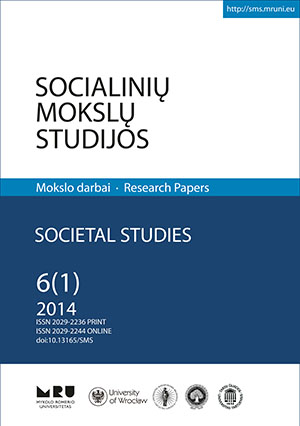Keturių „Stalo Atramų“ konsensuso modelis iš funkcionalizmo, takiosios modernybės bei kompleksiškosios teorijų perspektyvos
The model of four “Table Legs” for consensus from the perspective of functionalism, liquid modernity and complexity theory
Author(s): Vladas BartochevisSubject(s): Social Sciences
Published by: Mykolas Romeris University
Keywords: plural society; consensus; functionalism; liquid modernity; complexity; tolerance; integration
Summary/Abstract: Based on the principle that the intensification of people mobility and societies configurations differentiation is the ongoing process de facto in societies living under democratic values , reaction to the dynamism of the plurality in societies is one of the most urgent problems in the contemporary world. Focusing on this problem and trying to find answers for it, the author of this article created a unique model: KSAK model. KSAK is the abbreviation in Lithuanian of the phrase “The four “table legs” for consensus” (Keturios “stalo atramos” konsensusui). The objective of this model is to provide strong premises for the pursuit of consensus. In pluralistic societies, where living individuals differently perceive and react to reality, social cohesion cannot be sought through universalism. In this case, this cohesion can be reached only by compromise, by pursuit of consensus. The KSAK model consists of four main affirmations. These affirmations raised by the KSAK model require being analyzed and confirmed empirically and theoretically, being a strong base for the model, and consequently, to the “table” for consensus it might have a firm basis. Therefore, the goal of this article is to analyze the affirmations of the new model created by the author of this article, through various sociological perspectives, namely through the modern and postmodern sociological theory. For this, as a representative of modern sociology, functionalism of Émile Durkheim was chosen. As representatives of postmodern sociology, liquid modernity of Zygmunt Bauman andtheory of complexity of Edgar Morin were chosen. For the accomplishment of this work various theoretical literatures, mainly Portuguese, Spanish, Italian and English, were analyzed.
Journal: Socialinių mokslų studijos
- Issue Year: 6/2014
- Issue No: 1
- Page Range: 7-20
- Page Count: 14
- Language: Lithuanian

